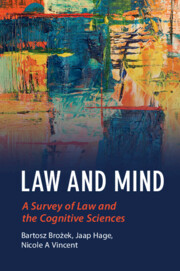Book contents
- Law and Mind
- Law and the Cognitive Sciences
- Law and Mind
- Copyright page
- Contents
- Figures
- Contributors
- Acknowledgements
- 1 Introduction
- I Metatheory and Methodology
- II Ontology and Epistemology
- III Legal Doctrine and Cognitive Sciences
- 11 Private Law and Cognitive Science
- 12 Private Law and Cognitive Science: A Methodological Commentary
- 13 Responsibility, Liability, and Retribution
- 14 Guilt in Criminal Law: Guilt in Us or in the Stars?
- 15 The Insanity Defense
- 16 Thoughts on the Insanity Defence
- IV Evidence
- V Dissenting Opinions
- References
13 - Responsibility, Liability, and Retribution
from III - Legal Doctrine and Cognitive Sciences
Published online by Cambridge University Press: 21 April 2021
- Law and Mind
- Law and the Cognitive Sciences
- Law and Mind
- Copyright page
- Contents
- Figures
- Contributors
- Acknowledgements
- 1 Introduction
- I Metatheory and Methodology
- II Ontology and Epistemology
- III Legal Doctrine and Cognitive Sciences
- 11 Private Law and Cognitive Science
- 12 Private Law and Cognitive Science: A Methodological Commentary
- 13 Responsibility, Liability, and Retribution
- 14 Guilt in Criminal Law: Guilt in Us or in the Stars?
- 15 The Insanity Defense
- 16 Thoughts on the Insanity Defence
- IV Evidence
- V Dissenting Opinions
- References
Summary
This chapter focuses on the relationship between liability in (criminal) law, responsibility, and retribution. It addresses the question of whether law – in particular criminal law – should base liability on responsibility and whether responsibility should be based on retributivism. In examining these questions, the aim of the chapter is to present the main lines of the debates surrounding them and to examine whether – and if so, how – compatibilism is a means to reconcile the different positions within those debates. A central role in this regard is reserved for a social practice we call ‘the practice of agency’ and the tension between two different ways of looking at the world around us, namely the phenomenological and the realist way.
Criminal liability can be justified by reference to consequentialism or retributivism. The latter fits into a view of the world that includes free will libertarianism; the phenomenological view of the world. This view includes agents with free will who are responsible for their actions and deserve liability on those grounds. It can be contrasted with the realist view, which denies the existence of free will and the possibility of responsibility or liability based on desert. Compatibilism suggests that these two views of the world can co-exist because our actual social practice of agency does not depend on any philosophical position. We argue that for compatibilism to be successful in this regard, it needs to be shown that (a) the two views of the world are about the same thing, and (b) that it is desirable for both views of the world to co-exist. The cognitive sciences are relevant for both of these claims.
- Type
- Chapter
- Information
- Law and MindA Survey of Law and the Cognitive Sciences, pp. 255 - 288Publisher: Cambridge University PressPrint publication year: 2021
References
- 1
- Cited by

